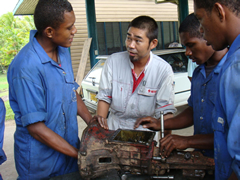Japan Overseas Cooperation Volunteers (JOCV) Overview
The JOCV Programme was established in 1965 by the Government of Japan as an organization under the supervision of the Ministry of Foreign Affairs to provide official technical assistance programmes to developing countries. As of the end of January 2010, 2,515 volunteers were deployed in 74 countries, making a total of 32,965 since the program’s inception.
In response to requests from recipient countries, the dispatch of JOCVs assists and promotes the overseas activities of young people between the ages of 20 and 39 who wish to cooperate in the economic and social development of developing countries. JOCVs generally spend two years in developing countries, living and working with the local people while taking part in cooperative activities. Furthermore, the experience also benefits the volunteers themselves as they strive to overcome the various difficulties they face in their personal relations and work.
Cooperation is provided in around 200 fields grouped into eight categories: 1) Agriculture, Forestry and Fisheries; 2) Manufacturing; 3) Maintenance and Operation; 4) Civil Engineering and Architecture; 5) Health and Welfare; 6) Education and Information Services, 7) Sports; and 8) Planning and Administration.
JOCVs are comprised of well trained and qualified professionals in a variety of technical disciplines, who work at the local level in recipient countries in order to best meet its host-country needs. At the same time, assistance at the local level deepens understanding of cultures and traditions and builds genuine friendship between volunteers and their hosts. The volunteers are mainly assigned to governmental organizations however; some of them also work for Non Governmental Organizations (NGOs) as well.
JOCV Programme in Fiji
The JOCV programme started in Fiji after signing the Exchange of Notes (E/N) on 5th of August, 1982 between the governments of Japan and Fiji. In July 1983, the first 2 JOCVs, whose technical fields were rice cultivation and agricultural machinery, were dispatched to the Ministry of Primary Industries in Labasa. They were expected to spread rice cultivation expertise and train farmers. This shows from the beginning that the dispatch of JOCVs has been focused on the fields which emphasize technical cooperation.
In the following April, two more JOCVs, whose technical fields were library science and ceramics, were assigned to Meteorology Department and Ministry of Economic Planning and Development. Since then, volunteers have been serving in various fields in communities across the country. One of the prominent fields is civil engineering, and volunteers in this field have been continuously dispatched since 1985.

In 1987, the first two nurses were dispatched to Sigatoka Hospital and Lautoka Hospital. The number of nurses increased, and nearly 30% of JOCVs working in Fiji were nurses at one time. Most of them were posted to Colonial War Memorial Hospital, Labasa Hospital and Lautoka Hospital. Cooperation in this field continued until 1999, and over 40 nurses contributed to improve healthcare in Fiji.
In the late 1990’s, the number of requests for JOCV increased as American Peace Corps withdrew from Fiji. Technical fields were widened in scope and demand for volunteers grew rapidly in the fields of Education and Information Services.
The year 2008 marked the 25th Anniversary of the JOCV Programme in Fiji, and the total number of JOCVs exceeded 400 in 2009.





scroll